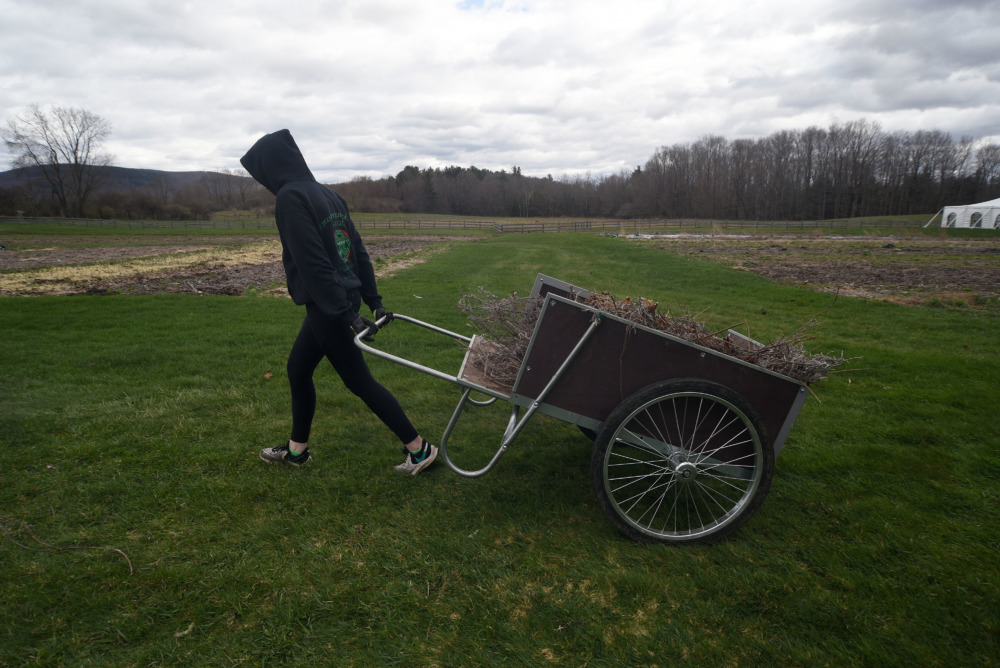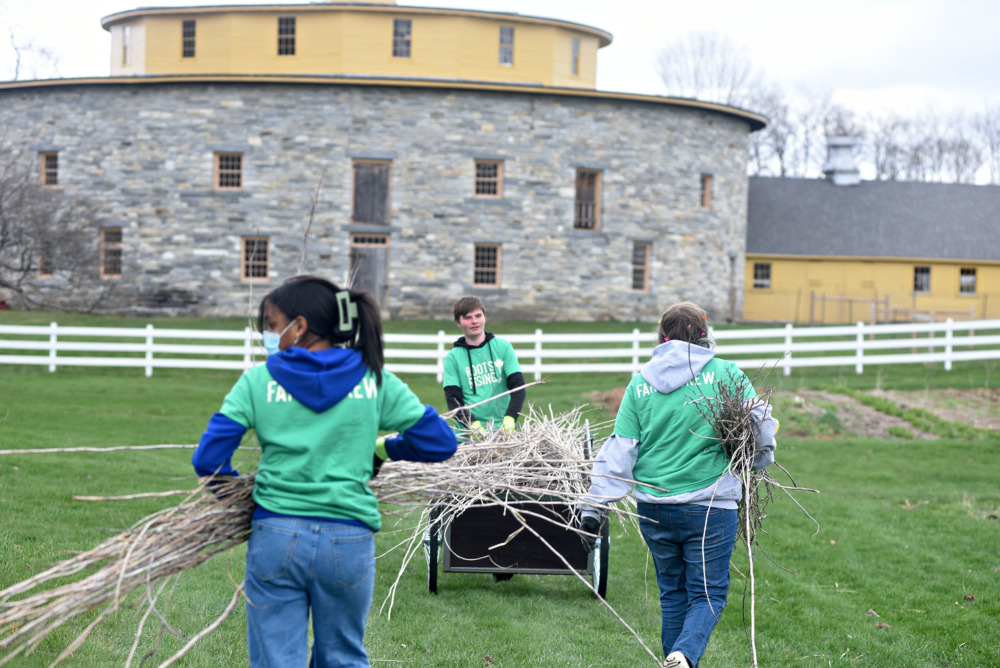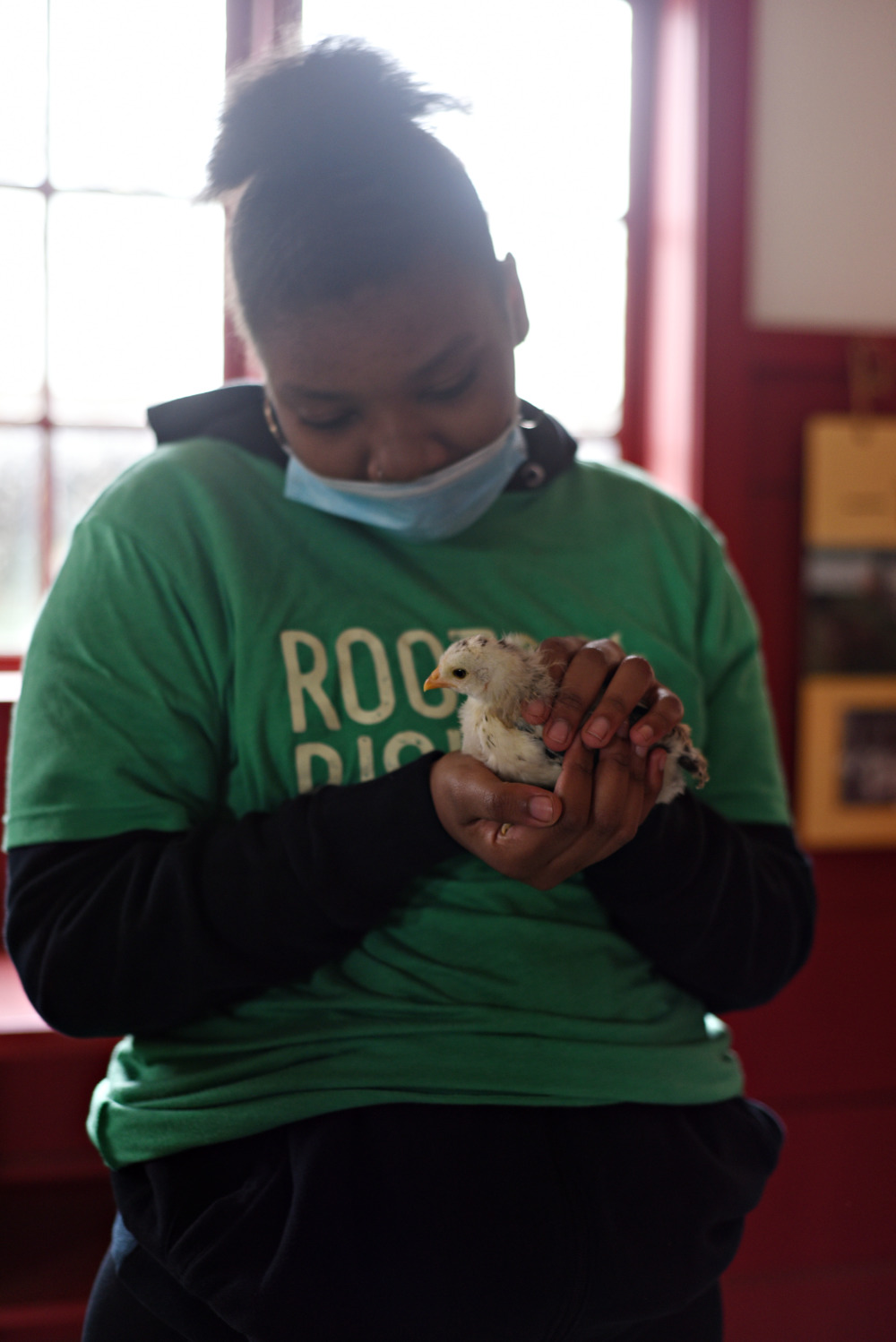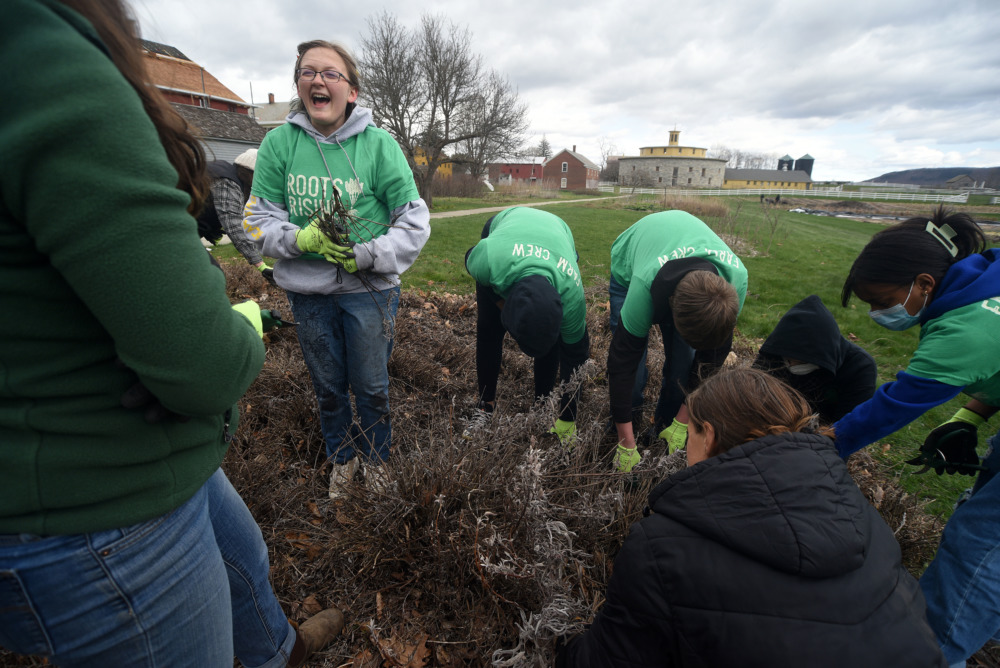Four years ago, at her first summer job, Brennah Brickle spent the early weeks hunched over rows of pea plants, picking and eating overly ripe pods that had split open. She fashioned tent-like supports of sticks tied with twine for the pole beans to climb. She spread nutrient-dense mulch at the base of both crops.
 “I’ve always been interested in the natural world but I’d never thought about where my food came from or how to support our local food economy,” said Brickle, 20, of Pittsfield, Mass., reflecting on that first year on Roots Rising’s summer farm crew.
“I’ve always been interested in the natural world but I’d never thought about where my food came from or how to support our local food economy,” said Brickle, 20, of Pittsfield, Mass., reflecting on that first year on Roots Rising’s summer farm crew.
In Brickle’s corner of rural, western Massachusetts, where tourists flock but many locals struggle to make ends meet, she and other 13- through 18-year-old farmers of Roots Rising and a separate project, Greenagers, are gearing up for the growing season. Some spent spring break 2022 building raised beds and hauling topsoil; others used after-school hours to cut back overgrown sage and prepare for the May 14 opening of the only teen-run market in a region spanning 946 square miles, 30 towns and two cities.
This summer, the youth aim to build upon last year’s achievements: Roots Rising welcomed 7,407 visitors to its weekly market; sold 459 households that rely on food stamps with $13,902.50 of locally grown food; and donated 2,500 pounds of produce to food pantries. The Greenagers built 92 raised garden beds whose yield went to 53 families; half of them were twice as poor as the official poverty level set by the state of Massachusetts.

Caroline Bonnivier
Roots Rising’s Erin Moriarty, 16, wheeling a barrow of sage branches to a brush pile at Hancock Shaker Village in the Berkshires.
“Food insecurity has grown exponentially during the pandemic,” said Jamie Samowitz, co-director of Roots Rising, which, like Greenagers, plans to expand its community outreach, hoping to fill even more bellies.
“The need is there,” she continued, “ … and we believe teens have an incredible amount to offer, [including] energy, passion and wisdom — plus a desire to make their community a better place.”
More than 11% of the roughly 129,000 residents of Berkshire County, which includes Pittsfield, lacked access to enough affordable, nutritious food, according to the 2020 Census. In a region whose average household income hovers around $62,000, more than $5,000 below the national average, pantries affiliated with The Food Bank of Western Massachusetts experienced a 60% increase in needy families’ requests for help between March 2020 to December 2020.
From teen helper to full-time food project staffer
When the Pittsfield Farmers Market opens for what will be its 10th season, Brickle, donning a new hat, will be its assistant market manager, overseeing transactions with farmers and vendors of cheese, bread and kimchi, while building connections with shoppers and her farming peers. The market, she said, “has really changed my life in the best way ever. It has shown me how I can directly impact my community, in terms of food justice and food insecurity.”
For their part, the Greenagers are meeting income-eligible residents where they are: at home, often in their yards.
A trio of teens spent their April vacation building garden beds to lay the foundation of this year’s Front Lawn Food, a 7-year-old offshoot of Greenagers, founded in 2007. Those beds will yield a harvest during the warm months. Then, between October’s first frost and May’s last one, coverings of plastic sheeting will transform them into mini-greenhouses, buffering crops as against Massachusetts winters so they can continue to be harvested.

Caroline Bonnivier
Ethan Spaulding, 15, and other teens of Roots Rising, hauling batches of dead sage branches at Hancock Shaker Village in the Berkshires.
This year, as the Front Lawn cohort sought more locations to build beds, they found one in a courtyard at Lee Housing Authority. On Thursday during that April school vacation, Finn Gibbons, 14, and Michael Bowser, 18, screwed together locally milled hemlock boards to construct four raised beds, each four feet wide by eight feet long. They were among 20 beds that the students from Monument Mountain Regional High School in Great Barrington constructed communitywide, then filled with 20,000 pounds of topsoil.
Their efforts have not gone unnoticed.
“Thank you, everybody,” said Dawn Trace, a 20-year resident of that rent-subsidized housing authority complex, pointing to the newly installed beds. “We appreciate the fresh vegetables that us on a fixed income can’t afford.”
Which is ironic, suggested Trace, who qualifies for rental aid but not food stamps. Her doctor recommends that she eat a fruit- and vegetable-dense diet, but Trace can’t afford it. “I don’t qualify for food stamps. My girlfriend does. But it’s only like, less than $100 [a week]. So you can’t possibly eat all those vegetables, right?”
The yield from those garden beds is supposed to help fill in the gap for people such as Trace.
Through food, connecting old and young
This year, in keeping with their mission to build teens’ vocational and sustainable farming skills, the Greenagers are growing their plants from seed, said Isamaya Hagstrom, food justice coordinator and outdoor educator at Greenagers.
“We’re hoping to invite [the students] back for the seedling run,” said Hagstrom, over the din of a cordless drill, referring to the frenzy of planting slated for after the area sees its last frost. “It gives them a chance to see their work after a month or so.”
Teen farmers also reap other benefits from Greenagers. Bowser said he is engaged in his high school studies but they don’t compare to his hands-on experience with Greenagers. “We have greenhouse class, but it’s not like this,” he said, gesturing toward tarps, topsoil, wheelbarrows and wood-handled spades scattered about the ground at his feet. “Installing garden beds for other people to plant in is real cool.”
There are other residual benefits.

Caroline Bonnivier
Jahliyah Moore, 14, breaking from fieldwork to hold a baby chick.
“The mental health of teens took a hit during the pandemic,” said Samowitz, suggesting that farming gives teens a sense of belonging and purpose that can steady their minds. “Their work directly builds a better world for us all.”
Sixteen-year-old Claire Jones’ mother had urged her to sign on to Roots Rising’s summer farm crew last summer.
“I was hesitant, but I’m crazy glad that I did,” said the Pittsfield High School student, who started out digging in the dirt but recently applied to join the market crew. “I would not have had the social tools or the confidence to interact so closely with so many members of the [Pittsfield] community [without it].”
Teens rise through the ranks by design.
“We’re really working on creating this pathway of employment for our teens,” said Vecchia, pointing to Brickle, who is starting her fifth summer with Roots Rising. “[Brennah] is our first alumni who has been hired on as staff, and we’re really proud of that.”
Brickle, as a high schooler, dreamed of leaving the area in search of opportunity. Four years at Roots Rising altered that: “My community needs me.”
Likewise, Roots Rising’s Jones revels in ensuring that people get fed.
“Food insecurity was actually something I saw right in front of my eyes,” she said, of what she witnessed in Morningside, a Pittsfield neighborhood where she has delivered produce. It’s deemed a food desert, an area, according to the U.S. Department of Agriculture, where at least 100 vehicle-less households are more than a half-mile from the nearest supermarket.
Partnering with local, adult farmers
Roots Rising partners with local farmers who bring their bounty to the teen-run market. For those whose no-till and other sustainable growing methods are labor-intensive and time-consuming, the extra hands are an added benefit.
“I love helping people gain access to the best food in the world, while directly supporting the people who grow it,” Brickle said.
Come mid-May, she’ll be spending her Saturdays at the teen-run market, interacting with farmers and food shoppers.
Said Jones: “I love the consistency of the market. I see the same faces each week. I love to know them, and I love to be known by them.”






























